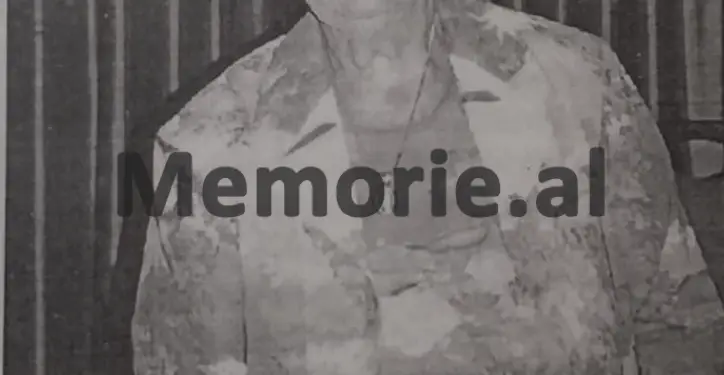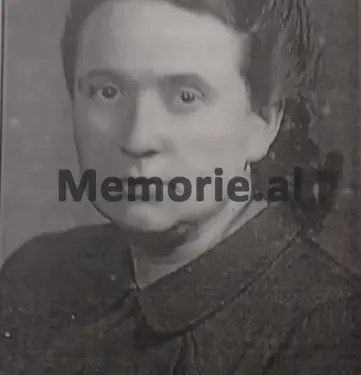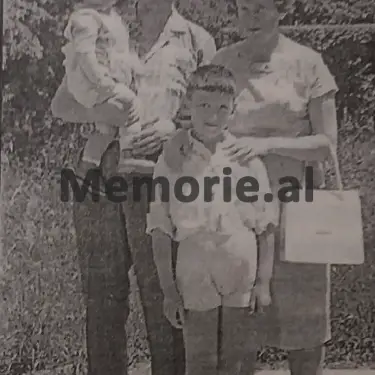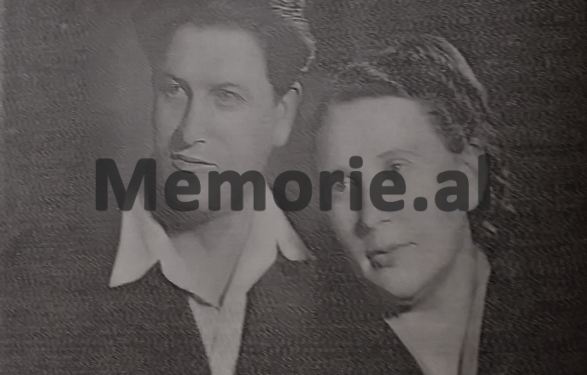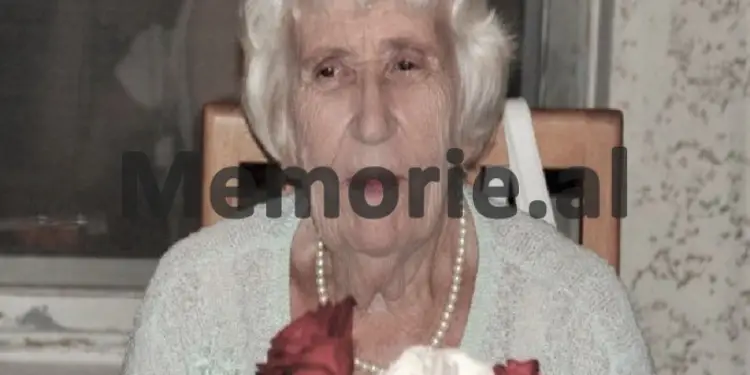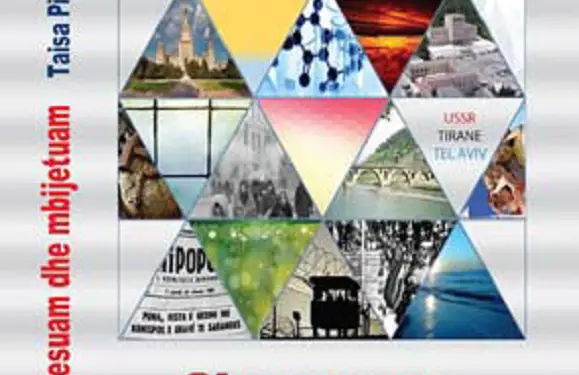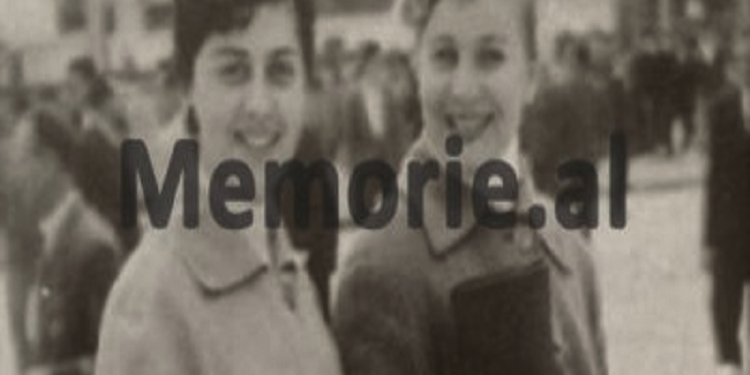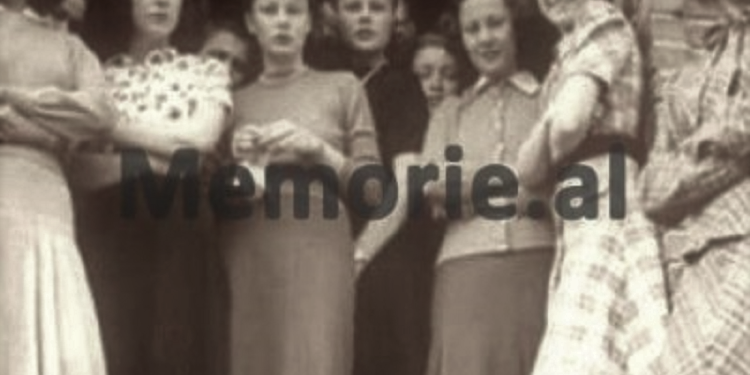Taisa Pisha (Batkina)
Part one
Memorie.al publishes the unknown story of the Russian Taisa Batkina (Pine), originally from Tula, Russia, the third child of a very poor rural family, who was orphaned at a very young age, after her father lost his life during work in one of the coal galleries on the outskirts of Tula, where he worked as a miner (shortly after escaping arrest, accused of “supporting the enemies of the people”) and she grew up with great difficulty economic, as their city continued to be under the bombardment of German forces, which had reached as far as near Kursk. Taisa graduated from the Faculty of Chemistry, near the ‘Lomonosov’ University of Moscow, where she met and married the Albanian student, Gaqo Pisha, originally from the city of Korça, who at that time was studying at the Faculty of Philosophy in Moscow and both together in 1957, they returned to Albania, together with their newborn son, Sasha, where they began life in the city of Tirana, Taisa was appointed as a professor of Chemistry at the State University of Tirana, while Gaqo, in the chair of Marxism- Leninism, where they worked until 1976, when the State Security arrested Taisa Batkin on fabricated charges, accusing her of being a “Soviet KGB agent” and sentencing her to ten years in political prison, which she suffered. in the “Women’s Prison” in the city “Stalin”, from where she was released in 1986, while her husband, Gaqo Pisha, had died in 1983, from a serious illness. The tragic story of Taisa Batkina (Pine), in the inhuman camps and prisons of Enver Hoxha’s communist regime, where she spent a decade of her life, along with many compatriots from the former Soviet Union, or other Eastern European countries, comes through her memories, published in a book entitled “We hoped and survived”, memories which, her son, Aleksandër Pisha, kindly offered her for publication, Memorie.al
We hoped and survived
I dedicate it to the bright memory of your husband, GAQO PISHA
This is a book of memories. In it I want to tell about my life and that of my friends, Soviet women, who tried prison for several years just because they got the courage and got married and linked their fate with that of Albanian students. The prison was part of the great GULAG in the small Balkan country, Albania, where for many years the bloody communist regime of Enver Hoxha ruled, who was a loyal student of Stalin and a follower of his cause.
Through this book I would like everyone to learn about the inhuman trials we experienced and the horrible years we spent in Albanian prisons, just because we… fell in love! And let no one ever forget what totalitarianism, despotism is and what the consequences of this system are.
The first part
My life
I was born in Tula, in 1932, into a civil servant family. My father worked in the mining industry, while my mother was an educator in a kindergarten; however before the war he did not work because he stayed at home to raise the children. Our family was more or less large: three children, parents and grandmother. The life we lived was no different from that of the majority in our country. The most vivid memories of my childhood are: moving and traveling by train from Shahta town to Tula town and the birth of brother and sister. I was not yet five years old when my mother promised to bring me a brother or sister. I asked her sister. A little later they brought home two babies. They put them in two small beds and I ran as close to each other as possible. One day I asked my mother: “You promised me sister, why you brought a brother with you?”
Very early, that before I went to school, I learned to read; I read a lot, memorized poems easily, and enjoyed listening to the radio. At home we had a small sound center, from where we could hear a lot of interesting things. We, the children, heard about Chkalov with friends whom we later imitated, playing in the yard. We also heard about the war in Spain and worried about Spanish children. My favorite book was The Little Spaniards, which wrote about the war in Spain and the Spanish children who came to the Soviet Union. My father was very hardworking. I loved him very much and he returned it to me with the same coin. Every day, I eagerly waited for him to return from work and we all sat down for lunch. Dad joked, asking me about everything, about my jobs and my toys. He himself told me about the work. I listened intently, even when the adults were talking to each other. But suddenly everything changed. The father came from work gloomy, no longer joking, more often silent. Several times I heard him mention a name and say to his mother, “They killed him.” “Where did they kill him?” I asked one day curiously. “In the niche!” – My mother answered, in such a tone that I did not ask anymore.
Many years later, among my father’s letters, I found an article in the Tula district newspaper “Komunari” of 1937, in which my father was accused of being friends with the enemies of the people, of lack of vigilance and of some other “sins”. As my mother later explained to me, my father escaped arrest by transferring to work in a coal mine, in a remote coal basin on the outskirts of Moscow. He started work away from the center and soon the event was forgotten. It is clear that we children did not know and did not understand anything. In the kindergarten where we went every day a plaque was hung: “Thank you Comrade Stalin, for our happy childhood” !. Next to the plaque was a large portrait of Stalin; the leader held in his arms the little Uzbek, the Mamlakat. The radio only talked about good things, only enthusiastic songs that we knew and sang. To the children, life seemed wonderful. We did not want to know about the plight of adults. Unfortunately, our happy childhood ended in June 1941, when the first German bombs fell on our heads, forcing us to leave the city. For three weeks we traveled by freight train, where we slept on plank beds. For the first three days the railway was bombed incessantly but we were able to cross the dangerous area without loss.
The bombing then stopped, but our journey continued to be very slow; we had to stop for days on the endless steppes because we had to make way for trains full of wounded people going into the background or soldiers and technicians going to the front. Thus, although we boarded the train in the fall, we arrived in Zlatoust (in the Urals) only in winter. We were surprised to see that in the city, the lights did not go out and the trams were running. But this did not last long. Very soon only enterprises, hospitals and schools started to supply electricity. At home we did the lessons under the light of the tail. The weather was very cold and everything was covered in snow. Even to this day, when I remember Zlatoust, I see only snow. I remember a snow-covered tram not far from our house. Life there was very difficult, we suffered from hunger and cold, we even had to bring wood ourselves from the forest. Grandmother lit the Russian stove and brought water from afar with two buckets hanging on the pole thrown to the wings. If it weren’t for the grandmother, I don’t know if we could have survived those difficult years because the mother often got sick. But as if we were somewhat relieved when our father came to Zlatoust and found us, who were released from the army for health reasons.
He started working in a military plant and at that time the working day knew no norm. We almost did not see each other, but we always felt his presence. Somewhere further the war was raging. We did not have a radio at home. We learned the news in school; in the morning’s students or teachers showed the notices of the Information Bureau. We, the students, also tried to help the front as much as we could: we went to hospitals, wrote letters to the wounded, organized concerts. One day, among the rare ones, my father took me to the city center, where on the side of the square hung a plaque with the scheme of the siege of German troops by our army in Stalingrad. We both rejoiced immensely at the success of the Red Army. Shortly afterwards, his father was called to Tula to start working on the coal mines in the Moscow suburbs. We stayed in Zlatoust, waiting for Dad to call us back from the evacuation. It was at this time that the mother became very ill. For almost a week he spoke wildly, with a high fever, unconscious. We could not help him because there was no doctor or medicine in Zlatoust. The situation was really critical. Every day our neighbor came to us, also one who had moved from Kiev. Once she came in the evening and without explanation, said to me: “Dress, and come”!
We walked long through the dark snow-covered city and came to a building, which I later learned was a hospital. There we searched and talked to a doctor, with whom our neighbor had known since before the war. I started crying: “Doctor, my mother is dying; she has been unconscious for several days, with a high temperature”. “Wait here!” – the doctor told us. We waited long in the dark hallway. Finally the doctor came and we headed home taking the shortest route, through a frozen stream and piles of snow. The doctor visited the mother and listened to her attentively. Then he sat down at the table and under the tail light, wrote something on a piece of paper. “My daughter,” he addressed me, “with this pamphlet you will go… (and he explained to me where I had to go)… there they will sell you a medicine… 6 tablets.” You should drink 2 grains a day. Money”? I had some money, which my father left us before he left. It was late, darkness, fear, only the snow let out a little light, but I left. I found the right building, bought the medicine from a woman wrapped in a large scarf, and hurried home. The mother took the first tablet and that night her temperature dropped. The next day he came to his senses… Everything seemed to get better. On the piece of paper I read the name of the medicine: “Sulfidine”. I later learned that he was among the first sulfamide preparations, which at that time acted magically. Grandmother took care of the mother, went to the slaughterhouse, collected blood, baked it in the pan and gave it to her. At the cart stations, he collected the spilled tray, boiled it, and his mother drank the juice, while we, the hungry ones, sucked up the grain waste.
When my mother finally got out of the house, we got ready and headed for Tula, the city still bombed by the Germans, who had stopped on the outskirts of Kursk. My father started working for the recovery of the mines in the liberated areas where we also lived in that period. A month and a half after we returned, my father was killed in the line of duty. The mother was left with only three small children and raised us, like many other mothers at the time, working day and night. We lived hungry, we dressed as best we could, we tried to help my mother, with as much power as we had and most importantly, we learned. In 1950 I graduated from high school with a gold medal and entered the Faculty of Chemistry, Lomonosov University in Moscow. College admission day was one of the happiest days of my life. The student years have been the best years of my life. Those were not very easy years, life was hard, I lived in a dormitory, away from home and only with a scholarship. My mother could not help me; she had a small salary and had to have two more children. Even the lessons were not easy; the demands were very high, the workload was quite large: lectures, laboratory work, colleges, but the subjects were interesting. The lectures were given by academics A. N. Njesmejanov, P. A. Rebinder, S. I. Wolfkovic, the corresponding members of the B.S. Academy of Sciences, V. I. Spicin, A.P. Terentjev and other wonderful professors. They taught us to work independently and to think logically. This knowledge helped me throughout my life in my work. I have always remembered my university and teachers with gratitude.
But how many interesting things we had besides lessons! Theaters, museums, concerts, student evenings, walks, excursions. That time constantly comes to my mind, like a wonderful dream. At university I met my future husband, Gaqo Pisha. He had come from Albania to study at the Faculty of Philosophy. Before coming to Moscow, he was involved in party work. In 1955, we were married and in 1956 our eldest son, Sasha (Sandri), was born. After I finished my studies, I was hired to work at the University. In 1957 my husband finished his studies and in June, we had to go to Albania. But, since the Moscow Youth and Student Festival were to take place in August of that year, most of the Albanian students, including my husband, joined the delegation of their country. Thus, the departure was postponed to the end of August. In April, I was fired from my job at the University, and with my son, I went to Tula, to my mother, to give my husband the opportunity to prepare for his diploma defense and state exams. During the festival I was able to take a week off, go to Moscow and live in an environment of joy, joy, music, gas, concerts. I have always loved Moscow, but the Moscow of the festival days was really magnificent.
At that time I felt miraculous: I had a husband and a son that I loved very much, and in my pocket I had a degree from Moscow State University. It seemed to me that I had nothing else to look for! We would go to Albania! It was a fraternal country, a member of the socialist camp. We would work together to build socialism and everything would go better. Yes, that’s how we were brought up, we believed every word, we did not doubt anything. Oh, if we only knew what life would bring and had the opportunity to raise even the slightest bit of the future! But this was something impossible to predict. There were parents who did everything in their power to sever their children’s ties with foreign students and not allow them to end up in marriage. My mother had no way of hindering me; I was in Moscow, away from home and commanding my own destiny. At the end of August 1957, together with the Albanian students and the delegation of the Albanian youth, we boarded the train to Odessa, from where we had to leave the next day for Albania with the ferry “Beloostrov”. Many people escorted me to Moscow. I remember, my poor mother crying incessantly. I do not know if she foresaw anything, or cried just because the eldest daughter, her support, educated with so much difficulty, was leaving, as she put it “seven seas captured”. But lo and behold the youth is extremely careless and selfish and I did not understand the mother’s concern. I am optimistic by nature so I did not cry. It seemed to me that I was heading towards a new life, to create my hearth, what every girl dreams of.
We stayed in Odessa for only one day. We went for a walk; I met my people who lived there as I got ready to move on to new life! The small ferry “Beloostrov”, with which we would travel, was full of young people. There were very few cabins and people slept on the deck and in the barn. We made an exception; we had small children, and they put us in a cabin, with two cramped beds next to the ship’s engines, where we slept in the scorching heat. The ship was buzzing with noise, songs, joy; on the upper deck the young men were sunbathing, and I did not let go of my two-year-old son. He was an agile kid, he ran fast and I was afraid he would fall off the deck. Even at the only stop in Bulgaria I did not get off, because the ferry nurse told me that the boy could get an infection on the shore. We traveled long, 7 days, crossed the coast of Greece and finally arrived at the Rada of the Albanian port of Durres. It was late and the ship had to anchor the next day. People remained silent, looking at the lights of Albania. There were students who had not been home for 5 years, while others, like my job, wondered what awaited them in the new country. Now I wonder: if someone approached me and told me what would happen to me in this place, would I go down to the shore, or would I come back from the line? I do not know, I think I would not believe it, because everything that happened to me later, then it would seem absurd.
In the morning we anchored. Gaqo came down to me and Sasha on the shore, where we looked for Gaqo’s brother, who had to wait for us. We did not see it! Wonder! But we had to get out so we left. We had no money. It left me speechless, the horrible heat and all the dusty square of the harbor before leaving. I stood in a shadow. The child was crying because he was tired. Nearby some children were playing in the dust. I felt very bad, I was not remembering any words, of the few that my husband had taught me, but that I had not learned well; I had no time, no diplomas, state exams, children, work. I wanted water, but I did not know how it was said in Albanian. An Albanian woman we knew during the trip helped me and brought me water. Finally all the formalities were finished, everything was arranged, and we left by train, to Tirana. It was getting dark. We did not find a place in hotels and we spent the night with acquaintances. In the morning the husband’s brother found us. He was a military engineer and was not allowed to come and wait for us. Gaqoja was appointed as a professor of philosophy at the University of Tirana and after a couple of days we left for Korça, to meet his family and visit relatives. On the way I saw that I had come to an eastern country.
In Albania of those years, but also many years later, you could see women dressed in çitjane and faces almost completely covered. Women in such characteristic clothing, men with rugs in their hands and national clothing, I saw in Elbasan when we got off the train and got on the bus. It was hot in the square, there was dust everywhere and we drank water. Some men were dodging among the people, with some strange vessels on their backs. They were selling a plant juice, which I did not know what it was, which they offered in unwashed glasses. I refused to drink, I decided to be patient. From Tirana to Korça, it is almost 250 kilometers, but the train walked very slowly, and the bus route was mountainous and narrow. On the way, they checked our documents several times. We waited for hours. We left Tirana early in the morning, and arrived in Korça late in the evening, when it was dark. Albania was the most backward countries in Europe. It was not until the 1930s and 1950s that road and enterprise construction began. In 1948, the first Tirana-Durrës railway was built. I liked Korça. Small town, very clean, with mostly bungalows, full of greenery and flowers. It was one of the most cultured cities in Albania. Before the war, many citizens of Korça had emigrated abroad. The city maintained stable ties with Greece and had a French high school with teachers from France. After graduating from high school, many young people continued their studies in France, Italy, Austria, and elsewhere. This spirit was still felt in the city. Korça did not look like an oriental city, people here lived European lives.
Gaqo’s mother, Artemisa or Arta for short, welcomed me very well. She was a small, weak, carefully combed woman. He was 69 years old at the time. She was a very good woman, calm and extremely hardworking. There was no school, but she remained a wise, educated and noble woman. She treated me very kindly and I loved her very much. Gaqoja took the two-week leave and spent it with us in Korça. These days remained in my memory like a colorful kaleidoscope: guests, relatives, acquaintances came. I had to entertain them all. I came out with trays filled with glasses of liqueur and various cakes. This is how habit used to love the “bride”. For me, who knew almost no Albanian, and who did not understand what and how I had to act, at first it was very difficult, but then I learned. After two weeks, Gaqoja left for Tirana to start work. He had to find work for me and home. I was left alone with my mother-in-law, without the opportunity to communicate in any language. I should mention with respect the help that my husband’s friends and relatives gave me. How can I forget Erieta Konomi, who came to us every day and helped me in everything? We went shopping together, the only place where I could buy food. The bazaar from the beginning left me speechless with the abundance. I had never been to the south and I was amazed by the piles of vegetables and fruits, with unparalleled beauty, the five-pound cabbage head and other wonders. I was just pointing, while Erieta was buying. We communicated together with the help of Albanian-Russian and Russian-Albanian dictionaries.
At that time in Korça there was a flu epidemic and everyone, me and Erieta, went to bed. Only I stood up and took care of everyone. Hand in hand I started to understand Albanian until when Gaqoja came to pick us up after a month and a half he was surprised to hear me talking to his mother and Erieta. Sasha, who at first did not approach his grandmother because he did not understand, was now accustomed to and did much after her. In October 1957 we moved to Tirana, where I lived for a total of 18 years. We started working at the University, I in the department of organic chemistry, and Gaqoja, in the department of Marxism-Leninism, of the newly opened University of Tirana. The first years of life in Albania, the Albanian authorities treated us very well. After six months they gave us an apartment. Even working in the lab was interesting. I was learning the language quickly and easily. I spent a lot of time with him; I was fired every day, two hours before I could work only in Albanian. I had to communicate in Albanian everywhere and this was an irreplaceable practice. To go to work and to the Faculty of Philology, where I learned Albanian, I walked several kilometers every day. Buses were still very few. Six months after coming to Tirana, I started teaching, directing laboratory work in biochemistry and completing the laboratory of organic chemistry, because next year its branch would be opened at the University of Tirana. At the same time I was doing scientific work.
During my school and college years I have always been an activist of the youth organization, organizer of its activities. When I came to Albania, I found many Soviet women who had married Albanian men. They had established their community, organized lectures, meetings, evenings. Of course, I soon became involved in community work and activities. Our main goal was to preserve our language, our way of life, our “identity”. We later found out that the authorities did not like this. Under the word “our identity” was hidden our desire not to lose our mother tongue, the culture with which we grew up and had nourished us. Most “Soviet women” were highly educated, loved books, theater. We could not lose these traditions so easily. So we needed to communicate, about conversations, about our movies. Since then I have thought and still think that the mother should address her children, in their mother tongue if she wants to establish warm spiritual relations with them, and to be able to pass on to them the knowledge, culture, customs, with which has grown itself. I have tried a lot and I have sweated a lot, so that for my children the Russian language, along with Albanian, becomes mother and I think I achieved this goal. This has helped them a lot in life.
The desire to preserve the mother tongue and culture did not prevent us from being included in the Albanian reality. We learned the Albanian language, socialized with colleagues, with neighbors, maintained good relations with relatives of our spouses. I also want to say something about the attitude of the Soviet embassy towards us. We married foreigners, following the Soviet government decision of 1954, which allowed Soviet citizens to marry foreigners. However, when I was doing the marriage registration paperwork, all the administration employees called me a traitor and were ready to look me in the eye. When we came to Albania, although we still retained Soviet citizenship, the embassy called us second-class people. /Memorie.al




